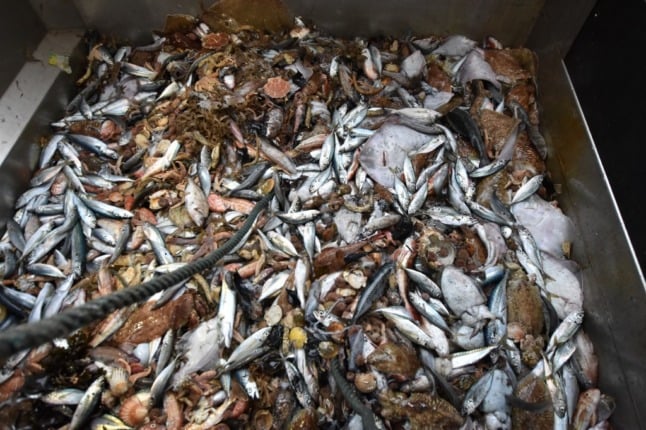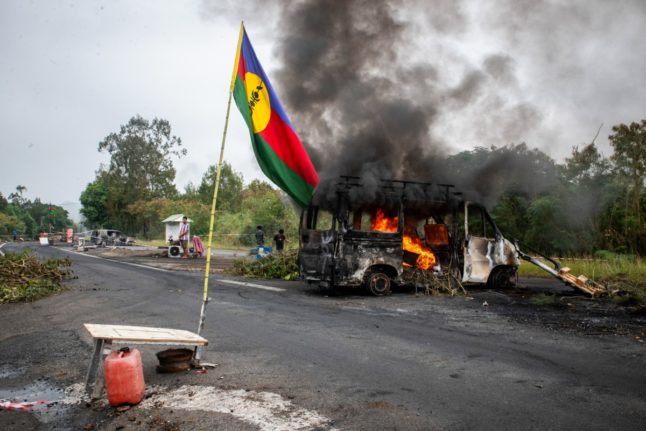The French government on Thursday accused the Channel island of Jersey of refusing to cooperate on post-Brexit fishing licences, rekindling tensions just weeks after Paris threatened to impose sanctions.
The island, a British crown dependency off the coast of northern France, is at the centre of a row about the granting of licences to French fisherman following the UK’s departure from the European Union.
“It is obvious beyond doubt that Jersey is not respecting the Brexit deal,” French Maritime Minister Annick Girardin said during a meeting with fishing representatives in northwest France.
READ ALSO France urges ‘rapid solution’ to UK fishing dispute
“Worse, it is showing an unwillingness to cooperate with us,” she added.
She said that 46 requests for licences from French fisherman had received no reply from the Jersey authorities, while another 52 licences had expired at the end of October “denying these fishermen access to Jersey waters.”
She said the government was preparing a rescue plan of 40 to 60 million euros ($45-$70 million) for French boat owners being forced to remain in port due to the loss of licenses.
“I hate talking about the idea of financing boats that don’t go out to sea as much as you do, but in all transparency we do need to organise the possibility of fleet reductions,” she said.
READ ALSO Macron’s dilemma over the Franco-British fishing spat
The plan raised alarm among fishermen and local officials, who saw it as an ominous sign that France would fail in convincing Jersey to comply with the post-Brexit trade accords.
“The battle is not lost, and negotiations are not over… I cannot accept that we start a massive move to destroy boats,” said Loig Chesnais-Girard, president of the Brittany region.
“We need diplomacy and the capacity to carry through with these talks so that the agreement is respected, because you know as well as I, if we give up on this, there will be other issues” subject to post-Brexit dispute, he said.
Post-Brexit trade war?
At the end of October, France threatened to ban British boats from unloading their catches at French ports and to subject all British imports to inspections, raising the prospect of a trade war between the neighbours.
Girardin has previously raised the possibility of restricting electricity exports to Jersey, which depends on the French mainland for its power.
Several rounds of talks between the British and French governments this month had soothed tensions and staved off the threat of sanctions, but without finding a durable solution.
READ ALSO Why are France and the UK fighting about fish?
France views Britain and Jersey as unfairly targeting French boats by either denying them licences or failing to respond to requests, undermining the deal between Britain and the European Union which guaranteed EU fishermen continuing access to British waters.
Britain and Jersey deny the accusations and say that the rejected French boats have been unable to prove that they previously fished in UK waters, now a condition for obtaining a license.
Analysts say relations between Britain and France are at their lowest in decades due to tensions over Brexit as well as cross-Channel migration.
Paris was also furious with London after learning it had taken part in secret talks with the US and Australia to form an Indo-Pacific defence pact, which saw Canberra scrap a huge submarine order from France.



 Please whitelist us to continue reading.
Please whitelist us to continue reading.
I saw an interview with the Jersey minister who seemed very matter of fact about it all. He said all the French had to do was produce their log books. He also said 17 of the applications were withdrawn when asked for their logs.
Just pull the plug and be done with it. Or just block the ports to keep les gammon out at Christmas.😛
Too late Boggy. British Gas got the old Jersey power station up and running again if needed.
Bugger. I’ll have to have a word with Vladimir😎
As a side issue. Don’t you think Frost is totally out of his depth. He always reminds me of a 70’s Millwall supporter.😄 Admittedly that’s an insult to Millwall😉
I actually think it’s the EU that belongs in the ’70s. Here, though, is something to chew on. If the UK had remained in the EU it would be paying about £18BN of taxpayers money to them this year. Since UK total exports to the EU are about £300BN, the maximum tax take on that would be about £18BN. Consequently , if the UK stopped exporting to the EU altogether, the UK taxpayer would be no worse off than if we had remained.
But more firms would have gone to the wall or moved their operations out of your country.
Alan. Nobody in the EU really cares anymore about your sad little Brexit. It was signed and done, but perfidious albion won’t honour what it’s signed. Never mind the 1970’s, UK is in the 1770’s. The UK government don’t care less about the standard of life of their ‘subjects, just their own self-interests. These angry, pathetic tiffs that the UK keep alive are purely for their domestic audiences and their own tawdry political survival. Wake up.
(Do you actually live in France or are you a Kent troll? No offence)
You seem to have a gripe but no actual point to make. I’m sure, however, if the UK had not honoured anything it signed , the EU would not be slow in doing something about it . Have they ?